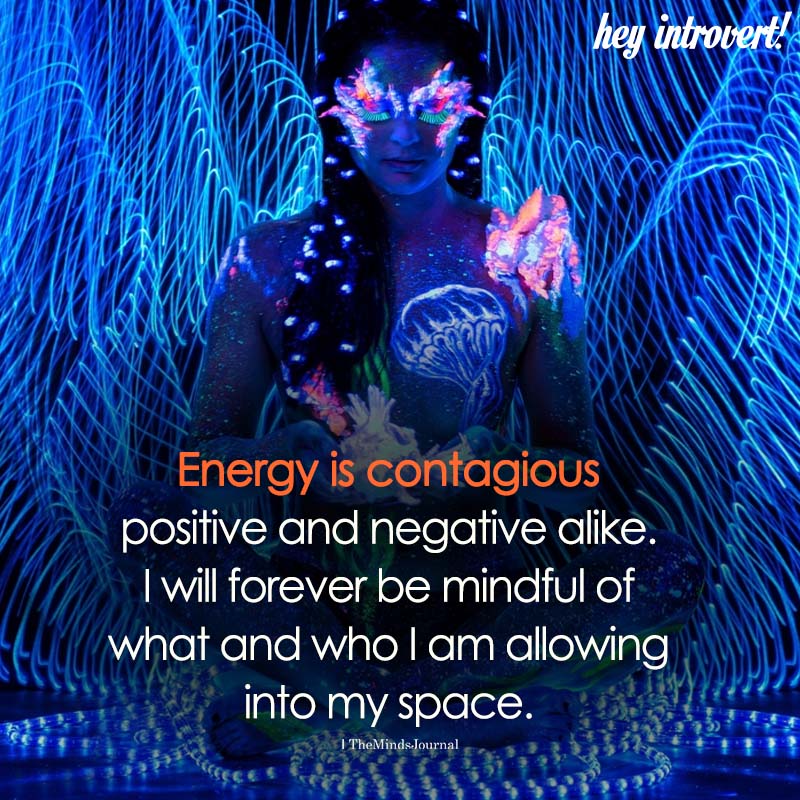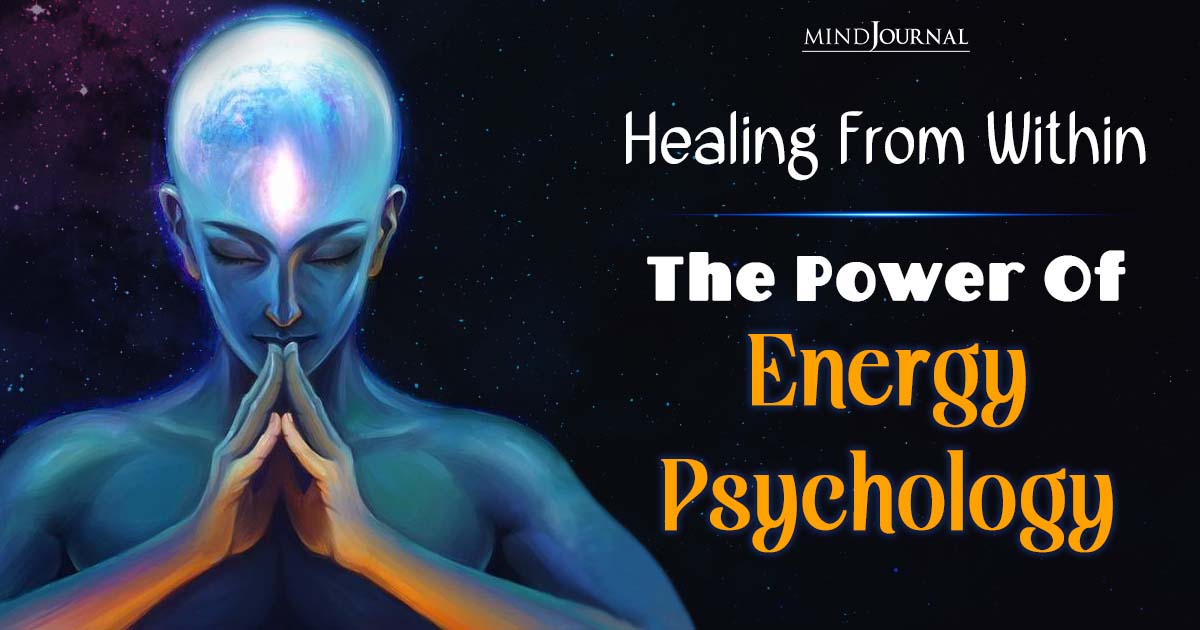What is energy psychology? It’s a new form of therapy that combines the wisdom of the East with the knowledge of the West to relieve you of your painful emotions.
In today’s fast-paced and stressful world, taking care of our mental and emotional well-being is of paramount importance.
Traditional methods of therapy and self-help have their merits, but there is a growing recognition of the profound influence that energy has on our psychological state.
Energy psychology, a relatively new field, is gaining attention as an innovative approach that combines Western psychotherapy techniques with Eastern practices to address emotional imbalances and promote healing.
In this article, we will explore:
- What is energy psychology?
- Types of energy psychology
- Energy psychology techniques
- Examples of energy psychology
- Benefits of energy psychology
Read Psychological Safety At Work: Why It Is Important And How To Make Your Team Feel Safe
What Is Energy Psychology?
Energy psychology is based on the premise that our thoughts, emotions, and overall well-being are influenced by the flow of energy in our bodies.
It draws inspiration from ancient practices such as acupuncture, yoga, and qigong, which view the body as an interconnected system of energy pathways or meridians.
The disruption or imbalance of this energy is believed to contribute to psychological distress and physical ailments like depression, chronic pain, anxiety disorder, phobia, or PTSD.

Types Of Energy Psychology
This therapy practice encompasses various techniques to restore balance and harmony within the body’s energy system. Here’re the commonly practiced energy psychology techniques:
1. Emotional Freedom Techniques (EFT):
EFT involves gently tapping specific meridian points while focusing on specific thoughts or emotions. This technique aims to clear energy blockages, alleviate emotional distress, and promote a sense of calm and well-being.
2. Thought Field Therapy (TFT):
TFT uses a precise tapping sequence on specific meridian points to address specific issues or traumas. By targeting the root cause of emotional disturbances, TFT aims to facilitate healing and reduce negative emotions.
3. Tapas Acupressure Therapy (TAT)
Developed by Tapas Fleming, TAT combines gentle touch on specific acupressure points with specific statements or intentions to address a wide range of psychological and emotional issues.
By engaging both the physical body and the mind, TAT aims to release energetic blockages, reduce stress, and facilitate the integration and resolution of emotional traumas.
TAT offers a unique and effective approach to promoting self-healing and personal growth by harnessing the body’s innate ability to restore balance and harmony within the energy system.
4. Psych-K:
Psych-K combines elements of psychology and kinesiology to reprogram the subconscious mind. Through muscle testing, limiting beliefs and thought patterns are identified and transformed into positive affirmations, allowing individuals to experience profound shifts in their mindset and behavior.
5. Reiki:
Reiki is a Japanese energy healing technique that involves the practitioner’s gentle touch or non-contact near the body to channel healing energy. It aims to remove energy blockages, promote relaxation, and restore balance in the body’s energy system.
Read The 11 Emotional Energy Centers In Our Body: The Mind-Body-Emotion Connection
Application
The process involves several key steps that aim to identify and address imbalances in the body’s energy system. While specific techniques may vary, the general process typically includes the following components:

- Assessment and Goal Setting: The first step is to assess the individual’s emotional state, identifying any specific issues, traumas, or imbalances they may be experiencing. This can involve discussing their concerns, conducting interviews, or using various assessment tools. Additionally, setting clear goals for therapy helps guide the process and focus on desired outcomes.
- Identifying Energy Imbalances: This treatment recognizes that emotions and psychological states are influenced by the flow of energy within the body. Practitioners may use muscle testing, observation, or intuition to identify areas of energy disruption or blockages. These imbalances are often associated with specific thoughts, emotions, or traumatic experiences.
- Technique Selection: Based on the assessment and identified imbalances, an appropriate technique or combination of techniques is chosen. There are various modalities available, such as Emotional Freedom Techniques (EFT), Thought Field Therapy (TFT), Psych-K, Reiki, and Tapas Acupressure Therapy (TAT), among others. The chosen technique will depend on the individual’s needs and the practitioner’s expertise.
- Application: The selected technique is applied to address the identified imbalances. This typically involves specific protocols or procedures that may include tapping on acupressure points, holding or moving energy, verbal affirmations, visualization, or other forms of energetic intervention. The practitioner guides the individual through the process, ensuring that they focus on the targeted thoughts, emotions, or memories while engaging in the technique.
As the specific technique is applied, the individual may experience shifts in their thoughts, emotions, or physical sensations.
The goal is to release or transform the energy disruptions and facilitate a sense of balance and resolution. This process may involve multiple sessions, with each session building upon the previous ones.
After the application of techniques, it is important to assess progress and provide ongoing support. The individual may be encouraged to practice self-help techniques or exercises outside of therapy sessions to reinforce the energetic changes and promote further integration.
Follow-up sessions may be scheduled to monitor progress, address any remaining issues, or set new goals if necessary.
All the therapeutic techniques described above can be administered by a trained professional and also practiced at home after being properly trained.
Read People Can Draw Energy From Other People Like Plants Do
Benefits Of Energy Psychology
According to research, this treatment has shown promising results in addressing a wide range of psychological and emotional issues, including anxiety, phobias, trauma, depression, and stress-related disorders.
By targeting the energy system, these techniques have the potential to provide rapid relief and long-lasting results, often surpassing the limitations of traditional therapies.
Moreover, this therapeutic practice can be easily integrated into existing therapeutic modalities, enhancing their effectiveness and efficiency.
It can complement talk therapy, cognitive-behavioral techniques, and mindfulness practices by addressing the energetic aspects of mental and emotional well-being.
Criticism and Controversy
Like any emerging field, this therapy treatment has faced its share of skepticism and controversy. Some critics argue that its underlying mechanisms lack scientific evidence, while others question the validity of energy-based approaches.
However, numerous studies have shown promising results, and anecdotal evidence from practitioners and individuals who have benefited from this treatment cannot be dismissed.
Energy psychology offers a unique and holistic approach to mental and emotional well-being by considering the influence of energy on our psychological state.
While more research is needed to fully understand its mechanisms, the growing body of evidence and the positive experiences of countless individuals suggest that this therapy practice has the potential to revolutionize the field of psychology.
By tapping into the power within us and restoring balance to our energy system, we can unlock our full potential for healing, growth, and overall well-being.
Now that you’re familiar with the concept and examples of energy psychology, let us know your views on this topic by commenting down below!
Frequently Asked Questions
What is psychic energy in psychology?
Within the classical psychoanalytic theory, psychic energy is the driving force behind all mental processes. It is regarded as the primary energy.
Who created energy psychology?
The concept of energy psychology was first popularized by Fred Gallo, Roger Callahan, and David Feinstein.
Can you be attracted to someone’s energy?
The sensation you encounter when in the presence of another person is essentially your energy interacting with and responding to theirs. There can be instances where you may encounter an indescribable metaphysical bond with someone, as you are inherently drawn to the energy they radiate.










Leave a Reply